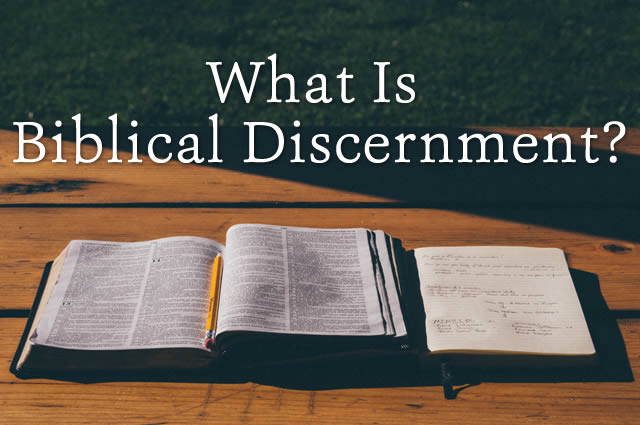There is a Christian song that says, “Every promise in the Book is mine.” Is that true? All the promises in the Bible were not written to you, or me. A more correct wording for that line in the song would be “Every promise written to me in the Book is mine.” However, that would probably not sing well.
Was a promise made to everyone and for all of history, or just to the Jews, or just to Christians, or some very specific person or group?
For instance, in Genesis 12:1-3 God makes promises to Abraham concerning his descendants and the land God would give him. This promise was not made to you or me.
Dr. Jay Adams, a leading Christian counselor, said in his book, A Call to Discernment, “…spiritual discernment is the ability to distinguish God’s thoughts and ways from all others” (page 46). How do you do that?
First, the more you know of what the Bible teaches the less likely you will be caught up in a “wind of doctrine” (Ephesians 4:14). People who work in banks are taught how to spot a counterfeit by being taught the hallmarks of the genuine currency.
A good tool for developing that knowledge is a classic book on systematic theology. I say “classic” because theology books that have been around for a long time have gathered reputations based upon their quality.
Second, you need to know some of the basic principles of interpretation and the historical contexts of the passages. Just because someone cites a proof text does not mean they are correct.
For instance this series of verses is a humorous example. Judas “went and hanged himself” (Matthew 27:5). “…said Jesus unto him, ‘Go and do thou likewise.’” (Luke 10:37). “Then said Jesus unto him, ‘That thou doest, do quickly’.” (John 13:27).
According to this we should all commit suicide. Obviously there is something wrong with our interpretive method by arriving at such a conclusion. Though it is extreme, it illustrates the principle. The Bereans were called “more noble” because they searched the scriptures every day to determine if what they were being told was true (Acts 17:11).
Third, you must know something of the variety of potential errors extant in our world today and in church history. Knowing those errors will help immensely in being able to spot a modern manifestation. This is the reason The News & Views (Vol. 3:10) carried an article on heresies in Church history. That will be followed this year with articles on specific past heretical groups and their modern re-occurrence
Many of the errors circulating throughout Church history depart from orthodoxy on either the nature of God, i.e., the Trinity, or from the biblical doctrine of man. For instance if man is considered essentially good in his nature then sin is not as big a problem.
This error is at the heart of the so-called “social gospel.” The gospel message that man is sinful and cannot please God is rejected. Therefore, less help is needed from God and more education, culture, medicine, etc. will bring about man’s perfection. As a result evangelism ceases and the community of believers stagnates and drifts into a self-help group.
“Study to show thyself approved unto God, a workman that needs not to be ashamed, rightly dividing the word of truth”
2 Timothy 2:15
How well do Christians understand Christian doctrine? Those of us who minister to cults often have cult members tell us what they have been told about Christian doctrine by other Christians. Often the cult members, not knowing Christian doctrine themselves, misunderstand what they are told. However, they also hear Christians misrepresent the most important tenets of our faith.
For that reason the following quiz was put together as a self-test. Use it for yourself, your family, even your Sunday school class or church. The answers follow the quiz. Grade yourself to determine whether you need further study.
I prepared a test very similar to this to be given to a class on Apologetics at a Christian high school last fall. The results revealed serious misunderstandings at the most basic levels.
How well do Christians understand Christian doctrine? Grade yourself.
Research in recent years by the Barna Research Group has shown many Christians hold views discordant with historic Christian orthodoxy. For example, they recently asked whether absolute moral truths change according to the circumstances. Only 22% believed in the existence of absolute moral truth.
Ultimately a version of these questions will be on our website as an interactive quiz with discussion of each question just a click away. But, until then, test yourself here and now.
Check up
…an instructive tool, to help learn about our foundational doctrines, and to show where we need to grow.
DOCTRINE QUIZ
- Is the word “Trinity” in the Bible?
___ yes ___ no
2. Is Jesus Christ God equally with the Father?
___ yes ___ no
3. Is the Holy Spirit God equally with the Father?
___ yes ___ no
4. How many Gods are there?
______
5. Jesus today is
___ a man only
___ divine only
___ divine and human
6. Are the Father, Son, and Holy Spirit the same Person?
___ yes ___ no
7. Is the Holy Spirit a personage like the Father?
___ yes ___ no
8. Which of the following is a correct statement?
The Trinity is defined as…
___ three Gods in one
___ three Persons in one God
___three Persons in one Person
9. Which of the following are omnipotent, omniscient, and omnipresent?
___ Father ___ Son ___ Holy Spirit (Mark any that are correct)
10. Is the Father “greater” than the Son?
___ yes ___ no
11. Is the Father “better” than the Son?
___ yes ___ no
12. Did the Father create the Son?
___ yes ___ no
13. Is Jesus Almighty?
___ yes ___ no
14. When Jesus became man He… ___ set aside His divinity ___ added humanity to His divinity
15. How did Jesus rise from the grave?
___ in the same crucified body ___a spirit___ a different body
16. Who raised Jesus from the dead? (Mark all that are correct)
___Father__Jesus__Holy Spirit
17. How important is the doctrine of the Trinity? ___ most ___very ___ somewhat ___ not very ___ not
18. Do you believe the Trinity can be proven from the Bible?
___ yes ___ no
Can you show the Trinity from the Bible?
Would you like to know more about the Trinity?
Watchman has resources to help.
Answers and Discussion
- No. However, its absence is irrelevant because the doctrine of the Trinity is there. The word was coined to express the concept of three within one. Many other words that express biblical doctrines do not occur within the text of scripture such as theocracy, millennium, and rapture.
- Yes. If Jesus were not fully divine, or equal in His nature with the Father, then His sacrifice for us on Calvary would be insufficient. Jesus said, “He that hath seen me hath seen the Father” (John 14:9). No finite, or created, being could ever compare himself with the infinite God.
- Yes. Scripture shows all three Persons of the Trinity to be equal in their nature and attributes. Each is eternal, omnipotent, omniscient, and omnipresent. The Holy Spirit is a personal being, having the attributes of personality, and is also eternal (Hebrews 9:14). If the Spirit is an eternal Person then He necessarily must be divine and equal with the Father.
- One. The ‘threeness’ of the Trinity refers to the Persons. The unity of the Trinity refers to the essence, nature, or, that which makes God be God. The essence or nature of God is not divisible into three parts which many of the analogies to the Trinity imply (egg, water, etc.).
- Divine and human. Philippians 2:6 and 7 says of Jesus that He was, “…in the form of God…. But…took upon himself the form of a servant.” The word “upon” is a word indicating addition to what He already was. Also, I Timothy 2:5 says there is “one mediator between God and man, the man Christ Jesus.” So, today in heaven our mediator is a man who is also eternal deity.
- No. The three Persons of the Trinity exist simultaneously. This is illustrated in the baptism of Jesus described by Matthew 3:16,17, which says, “…and he saw the Spirit of God descending like a dove, and lighting upon him: and lo a voice from heaven saying, This is my beloved Son….” All three Persons are in this event proving they are not the same Person.
- Yes. The Holy Spirit has the attributes of personality, intellect (I Corinthians 12:8), emotion (I Thessalonians 1:6) and will (I Corinthians 12:11) just as does the Father.
- Three Persons in one God. Heretical groups teach three persons in one person (United Pentecostals teach modalism and Jesus Only), and three gods in one god (Mormonism).
- All Three. Each Person of the Godhead is all powerful, all knowing, and everywhere present.
- Yes. However, the term ‘greater’ must be understood in their positional relation to one another. The Father is the “first” Person of the Trinity, the Son is the “second” and the Spirit the “third.” However, each is equal in every attribute of deity. Just as a President is ‘greater’ than a Vice President so the Father is “greater” than the Son.
- No. The term ‘better’ implies superior in some fundamental way as in a superior being. Jesus is “better” than the angels (Hebrews 1:4) because He is a superior being to them.
- No. The Father-Son relationship is an eternal one. He did not create the Son in any sense of the word.
- Yes. Jesus said, “All power is given unto me in heaven and in earth.”
- Jesus added humanity to His divinity. Many Christians incorrectly assume that when Jesus left heaven to be born of Mary He set aside His deity for the time He was here. That is not the case. He “Made himself of no reputation” (Philippians 2:7) which means that He set aside the shekinah glory and His prerogatives as deity to relate to us on a human level. In that way we can identify with Him because He identified with us.
- In the same crucified body. Jesus said at John 2:19-21, “Destroy this temple and in three days I will raise it up…. But he spake of the temple of his body.” When Jesus said these words the body He was referring to was the one He lived His life in, the one the disciples knew. Therefore, the term “it” in the above verse must refer to that same body.
- All Three Persons in the Trinity raised Jesus from the dead. In the verse cited above Jesus said He would raise His own body from the grave. Acts 2:24 says, “Whom God hath raised up….” Romans 8:11 says, “But if the Spirit of him that raised up Jesus from the dead dwell in you, he that raised up Christ from the dead shall also quicken your mortal bodies by his Spirit that dwelleth in you.”
- Most. The doctrine of God is the foundational doctrine in any religion. In Christian doctrine everything flows from the nature of God. Understanding any doctrine of the Christian faith begins with understanding the Trinity and the attributes of God. It is the foundation of our faith and Christ is the Chief Cornerstone.
- Yes. The method to use to demonstrate the Trinity is fourfold. First, to show there is only one God (Deuteronomy 6:4). Second, to show that the Father is called God (1 Peter 1:17). Third, to show that Jesus is called God (John 1:1). And finally, to show that the Holy Spirit is called God (Acts 5:3,4). The conclusions possible are: 1) That the Bible is hopelessly contradictory, or 2) That the three Persons are the One God.
Conclusion
Without a solid understanding of our doctrinal basics our ability to discern truth from error is severely limited. This is why so many “winds of doctrine” blow through the church and lead people into error and bondage.
We believe such a quiz as this can be an instructive tool, to help learn about our foundational doctrines, and to show where we need to grow.
You comments on this quiz are very welcome.
By David Henke






